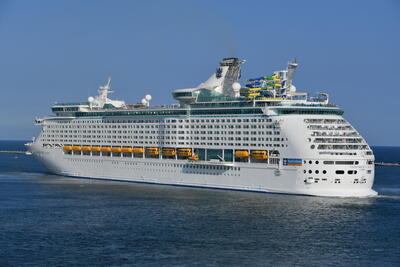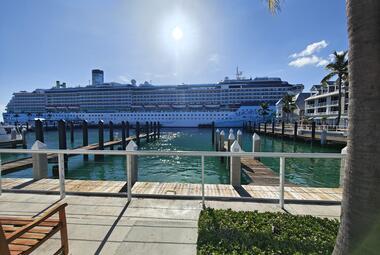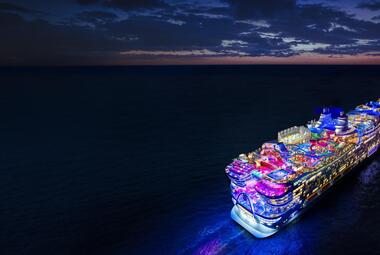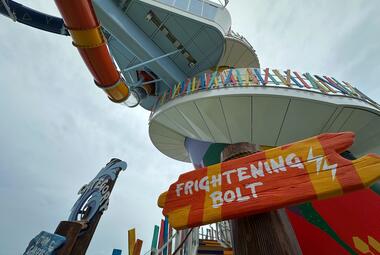Oftentimes, you can find a great value on transatlantic cruises. This, however, means that you have to be committed to spending many days onboard the ship as it sails across the Atlantic Ocean.
When taking a transatlantic voyage, the ship that you are on is being repositioned from one homeport to another, marking the beginning or end of a specific cruise season. When, for instance, you sail from Florida to Barcelona or Rome, this is because a ship is getting ready to begin her season in Europe.
What makes these cruises unique is that they include more sea days than other sailings, as they have to travel between continents. Plus, they are also longer than a lot of other cruises and usually fall somewhere close to two weeks in length!

Cruise.Blog had the opportunity to speak with reader Don Goldstein, a retired Commander in the U.S. Coast Guard, about his 15-night cruise onboard Explorer of the Seas from Miami to Rome (Civitavecchia). This itinerary included six days at sea, and he was kind enough to share some of his experiences with us about his time onboard.
Keep on reading to learn more about what you can expect on transatlantic cruises!
Goldstein opted to book a Junior Suite for his cruise that costed him a little under $4,000 for two people.
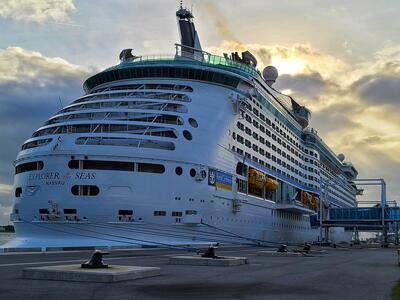
Pricing, of course, varies based on the actual itinerary and cabin category. Looking ahead into April 2024, a 13-night cruise from Miami to Barcelona on Explorer of the Seas is currently advertised at $496 per person. This rate is for two people staying in an interior room and does not include taxes, port fees, or gratuities.
Even so, spending $4,000 on a 15-night cruise means that Goldstein paid around $133 per person, per night. This is a great value for a cruise vacation, especially a suite! For that price, he and his wife got unlimited food, drink, entertainment, activities, and, of course, all the benefits that accompany a Junior Suite.
After the transatlantic cruise ended, Goldstein and his wife stayed onboard Explorer for another 6-night cruise from Rome to Venice (Ravenna), again in a Junior Suite. This cruise, which was significantly shorter, cost $3,100 for two, breaking down to around $260 per person, per night!
In addition, airfare cost about $800 per person from Venice to Tampa on Delta Airlines. One tip to avoid paying for flights is to redeem credit card points. Depending on your card, you may be able to transfer points to a major airline. This can save you hundreds, if not thousands, of dollars!
The extended time in Europe made the trip worth the cost.

"The additional stay, both the [back-to-back cruise] and the four days in Venice, made the airfare more palatable. For us, the transatlantic cruise was worth it on its own," Goldstein said.
Even if you do not extend your trip with another cruise, a great way to make the most of your trip is to plan a post-cruise stay in your disembarkation city. It will help balance out the time you spent relaxing onboard with the time you are able to culturally immerse yourself in a different place.
If you are sailing West (i.e., from Europe to the United States), you will want to arrive in your embarkation city a few days earlier than your scheduled departure day.
Read more: The costly cruising mistake newbies make planning their first cruise
Popular ports include Barcelona, Spain; Rome, Italy; Southampton, England; and Lisbon, Portugal. If you've already visited those cities or have another dream destination, traveling throughout Europe is pretty simple thanks to their train system!
What's the onboard experience like?
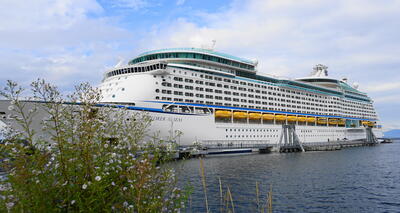
After six days at sea, Explorer of the Seas was supposed to dock in Ponta Delgado, Azores; however, the port was cancelled due to high winds-- think those over 90mph! Because of that, they had more time onboard than they thought.
The initial itinerary included the Azores followed by two more sea days and then stops in Málaga, Spain; Cartagena, Spain; Barcelona, Spain; Toulon, France; Ajaccio, France; and Corsica, France before docking in Rome. This is a great reminder that your itinerary is subject to change at anytime, and it is important to remain flexible.
"We love sea days," Goldstein remarked, "which is why we have done several transatlantic [cruises] and have two more booked. Having said that, we also love to experience the culture in the various ports."

While at sea, Goldstein and his wife spent their time reading and playing various trivia games: "As long as we have our Kindles and a glass of wine, we are never bored!"
In terms of additional onboard entertainment and programming, he said that some shows were good, while others were not. There was some repetition, too, especially due to the cancelled stop in Azores, as the headliner act was supposed to swap out but was unable to.
"The gentleman that stayed onboard put together another show with one day's notice," said Goldstein, "a real trouper!"
When it came to dining, the couple opted to eat in the Main Dining Room each night, rather than mix it up and book specialty dining experiences. This ended up giving them enough variety, though, as the menu was only repeated once!

They were seated at a table for eight that was comprised of four different couples, all of which showed up every evening except one. According to Goldstein, this couple celebrated a birthday at Chops Grille that night.
"The eight of us got along very well, even through we had never met prior to the cruise," he said.
Alternatively, transatlantic cruises are a great time to work your way through all available dining options onboard any given ship. Of course, you can customize your cruise vacation in any way that you'd like!
Read more: 14 cruise ship extra charges you should know about
When sailing from the United States to Europe, you pass through many different time zones.

By the time the ship docked in Rome, the time zone had to be changed to be six hours in advance. The Captain onboard chose to make the change at 2:00am for each of the sea days, advancing the ship's time by a single hour at a time. This meant that the ship skipped 2:00am, and the clock went from 1:59am to 3:00am each of the sea days!
This was different from Goldstein's last transatlantic cruise, which was also heading East, when the Captain chose to make the change at 12:00pm each day.
On typical cruises, your ship won't change time zones. Instead, it will adhere to "ship time." If the local time in a port of call is different from the embarkation port, your ship will usually remain on the embarkation port's time.
Was there a difference in passenger demographic? According to Goldstein, fewer children were onboard than normal.

Explorer of the Seas is an older ship, having set sail in 2000. Because of that, there is less to do onboard than compared to some of today's larger ships, such as Symphony of the Seas, Carnival Celebration, and Norwegian Prima. You will not find any zip lines, sky diving simulators, bumper cars, roller coasters, or go-kart tracks on this older ship.
Additionally, many families cannot pull their children out of school for two weeks at a time. Most, if not all, transatlantic voyages take place during the traditional academic year, not during summer or winter breaks.
After arriving in Europe, though, Goldstein noticed that the 6-night cruise from Rome to Venice had many more families with children onboard.
Many first-time and veteran cruisers stray away from transatlantic sailings because of their length. Goldstein, however, recommends them.

Since this sailing was longer than usual, it gave the couple a greater opportunity to get to know the crew members. For many, this is a highlight of any cruise vacation, as they work hard to make sure that any voyage -- no matter if it is 3-nights or 15-nights -- is as memorable as possible.
"[Transatlantic cruises] are by far the most relaxing way to travel," he said.
"Some people are concerned about the seas crossing the Atlantic Ocean, but in our experience they normally are not much different from what we’ve found in the Caribbean."
If you're worried about getting seasick, Goldstein said that his wife is subject to feeling the effects of a rocking ship. She, however, takes Bonine every day and has never had any issues while on any Royal Caribbean cruise.
Read more: Bonine vs. Dramamine for Motion Sickness: Which Is Better for a Cruise?
The only caveat is that if you dislike sea days, Goldstein says you should not do one. There is no point in booking a vacation if it does not appeal to your interests.


